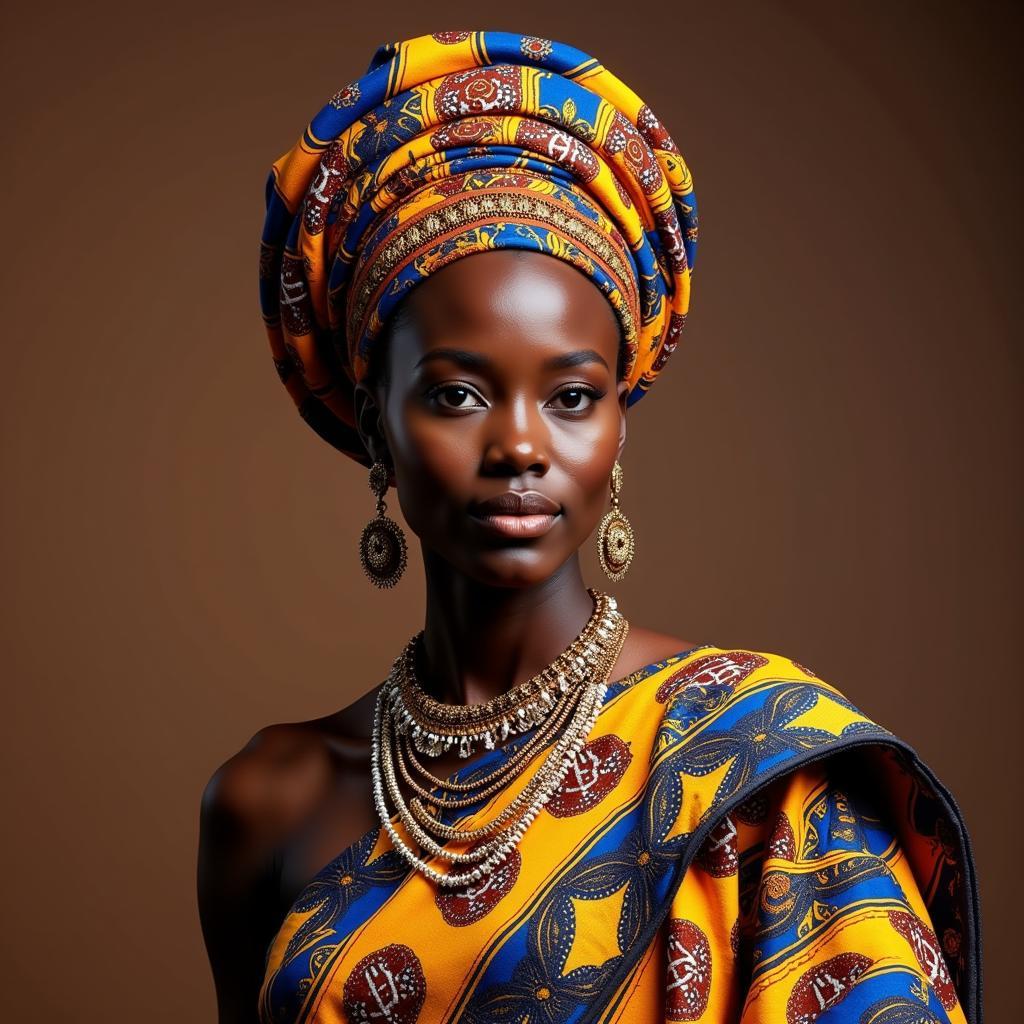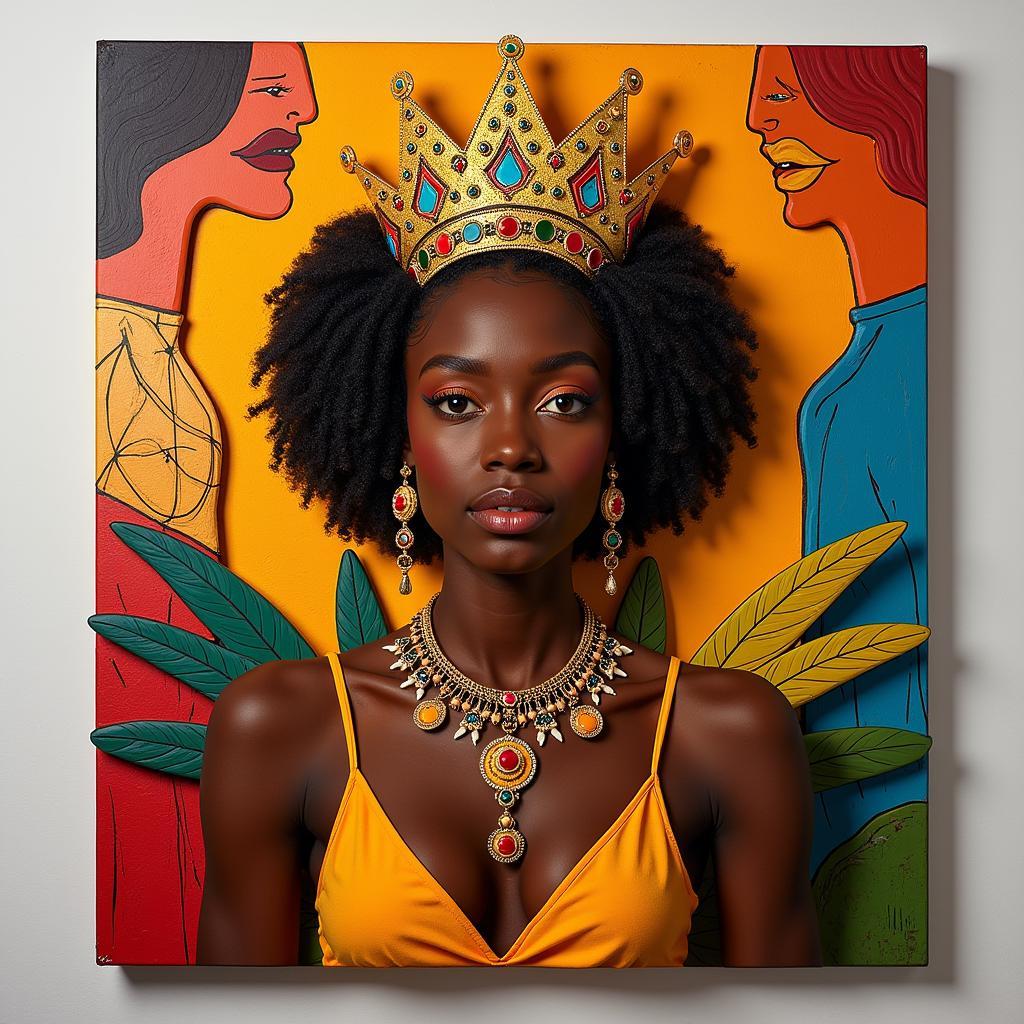Unveiling the Many Facets of the African Queen
The term “African Queen” often evokes images of powerful women adorned in vibrant fabrics, their stories deeply intertwined with the continent’s rich history and diverse cultures. But who is the African Queen, really? Beyond romanticized portrayals, the term encompasses a spectrum of meanings, reflecting the strength, resilience, and multifaceted nature of African womanhood.
 African Queen in Traditional Attire
African Queen in Traditional Attire
Delving into History: Queens and Power
Historically, numerous African societies were matrilineal, with lineage and inheritance passed down through the female line. In these societies, women held significant power, often ruling as queens, queen mothers, or as influential figures within the king’s court. Examples include:
- Queen Amina of Zaria (Nigeria): A fierce warrior queen who expanded the Zazzau kingdom in the 16th century.
- Queen Nzinga Mbande (Angola): Known for her political and diplomatic acumen, she fought against Portuguese colonialism in the 17th century.
- Yaa Asantewaa (Ghana): A queen mother who bravely led the Ashanti rebellion against British colonialism in the early 20th century.
These are just a few examples of the many powerful women who shaped African history. Their stories are testaments to the leadership, courage, and influence that African women have always possessed.
Beyond the Throne: Everyday African Queens
 African Women in a Bustling Marketplace
African Women in a Bustling Marketplace
However, the spirit of the “African Queen” extends far beyond those with royal titles. It’s embodied in the countless women who navigate daily life with unwavering strength and grace. They are:
- The Mothers and Matriarchs: The heart of the family, nurturing and guiding future generations.
- The Entrepreneurs and Businesswomen: Fueling the continent’s economy with their ingenuity and drive.
- The Artists and Creatives: Preserving cultural heritage through music, dance, fashion, and storytelling.
The “African Queen” is a testament to the diversity of female experiences across the continent.
The “African Queen” in Contemporary Culture
In contemporary culture, the term “African Queen” continues to evolve. It’s used to celebrate black beauty, strength, and achievement globally.
 Modern Interpretation of the African Queen in Art
Modern Interpretation of the African Queen in Art
- Music: [2baba african queen] is a popular example of how music celebrates the beauty and strength of African women.
- Fashion: African designers are gaining international recognition for their unique designs, which often draw inspiration from traditional patterns and styles, reimagining the image of the “African Queen” for a global audience.
- Literature: Contemporary African authors are giving voice to diverse female characters, challenging stereotypes, and redefining what it means to be a woman in modern Africa.
The Legacy Continues
The “African Queen” is more than just a title or an image; it’s a powerful symbol of resilience, strength, and the multifaceted nature of African womanhood. By understanding the historical context, cultural nuances, and contemporary interpretations of this term, we gain a deeper appreciation for the invaluable contributions of African women throughout history and their continued impact on the world stage.
FAQ
Q: What are some common misconceptions about the term “African Queen”?
A: One common misconception is that it refers to a single, monolithic image of an African woman. However, the reality is far more diverse. The term encompasses a wide range of experiences, backgrounds, and social roles, reflecting the richness and complexity of the African continent.
Q: How does the portrayal of “African Queens” in media impact perceptions of African women?
A: Media representation plays a crucial role in shaping perceptions. While there have been positive strides, it’s important to be mindful of stereotypical portrayals that can perpetuate harmful biases. Promoting diverse and nuanced representations of African women in media is essential to challenging these stereotypes.
Further Exploration
To learn more about specific African queens or delve deeper into the history of women in Africa, we invite you to explore other articles on our website, such as [2face african queen] and [2face idbia african queen].
For those interested in the evolution of the term in popular culture, we recommend exploring the musical impact of songs like [2baba african queen].
Need assistance? Contact us at +255768904061, email kaka.mag@gmail.com, or visit our office in Mbarali DC Mawindi, Kangaga, Tanzania. Our dedicated team is available 24/7 to assist you.
